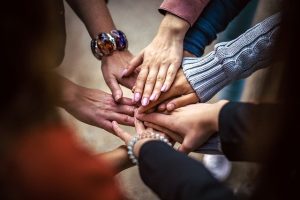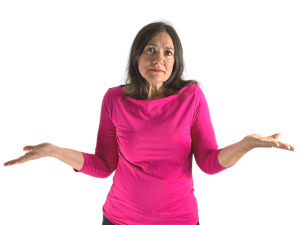by Jenny Rose | Sep 24, 2022 | A Flourishing Woman, The Journey
As I’ve thought about this post, I realize the theme of being lost and found is a thread running through my life and my writing. Years ago, when I was first introduced to Clarissa Pinkola Estes and devouring everything I could find by her, she used a phrase I’ve never forgotten: everything lost is found again.
Everything lost is found again.

The possibility of that truth gave me deep comfort, something I badly needed in those days.
Maybe we don’t find all the things we lose in our lifetimes, and maybe not in our deathtimes. But maybe someone else finds what we lost. Or maybe what we lost comes back to us looking so different we don’t recognize it. Or maybe what we lost is not truly lost at all. We carelessly leave things behind, or we amputate them, or we deny they were ever there in the first place. We fear we’ve lost them. We try to lose them. But maybe they never really leave us, they just hide somewhere in the attic of our minds until we need them. We ascend the stairs, enter the musk and debris of years, all the broken, aging, outdated and rejected parts of our lives and ourselves mouldering together in cobwebs and dust.
I like to imagine that.
I’ve posted before about being lost and found. I went back and read it as I worked on this post, so as not to be repetitive. That post was a seasonal meditation on the nature of change. I didn’t explore it quite from the angle of losing to find.
I came across a quote recently from Kristin Martz: “We lose ourselves in the things we love. We find ourselves there, too.” It made me smile, and think about the parts of my life so deeply absorbing I am self-forgetful as I live them. My head is empty. I am pure being, without self-consciousness or anxiety. Time does not exist. I feel a kind of boundary ecstasy, an awareness of connection to everyone and everything, an essential and lovely part of some greater whole.
Perhaps during such times we lose all the crust, the armor, the accumulation of useless and punishing junk we’ve somehow picked up or been taught, and are pared down to who we really are in our souls and spirits.
Many of us don’t want to let go of our junk, though. It’s been with us so long it forms part of our identity, part of our story, and we don’t want to let it go. Then who would we be? How would we recognize ourselves? What might change? What different or challenging things might we be required to do? We don’t take the leap into anything we might lose ourselves in, so we never fully find ourselves, either.

Photo by David Hofmann on Unsplash
Maybe the times in life when we truly feel we’ve lost it all are also the times we’re finding unimaginable grace and meaning.
It’s a circle, a natural life cycle, an ebb and flow of experience.
Another thing I came across somewhere years ago is the idea of an older, wiser version of ourselves, always at our shoulder supporting, advising, guiding, and cheering us on as we journey through our lives. I often make a picture of it in my mind, myself as an old (well, older!) crone, holding my hands out to a younger, struggling self the same way I hold my hands out to children I’m teaching to swim.
“You can do it. I’m right here. I won’t let go of you. You’ve got this! Now … swim!” Or jump. Or put your face in the water.
“Risk,” my elder self says, “dare, follow your heart, do what you need to do for yourself. Go ahead, write, it, dream it, imagine it, enjoy it. Be happy. Play. Rest. This is the way forward.”
And, “I believe in you.” That’s what I most long to hear.
I know it’s terribly cliched, but lately I’ve been thinking about what life means. Does it mean anything? Can anyone say what it means, or must we all make our own meaning? I lean toward the latter. I’ve wondered before what life is for, what I am for, but always in soul-dark times. This is not a dark time for me. In fact, I’m gradually coming back into the light. Now the question is a curiosity, a toy, and my answers are not concrete, not a vehicle for getting through another day, but more intuitive and less formed into language.
I keep going back to that quote: “We lose ourselves in the things we love. We find ourselves there, too.”
Losing everything to find something. There’s some kind of deep truth in that my intellect can’t quite grasp, but my spirit does.

Photo by Cristian Newman on Unsplash
I wonder, with an inward smile, if that’s not my answer for the meaning of life. Finding myself, however that happens. Paring away all the scar tissue and junk, losing and losing and losing the people and places I thought were part of my identity, along with objects, money, youth, innocence, and countless other small, ordinary losses we all experience until the best, most extraordinary me is revealed. Wouldn’t it be ironic if the meaning of life is nothing more than to immerse ourselves in it, cherish our physical experience and pleasures, give ourselves to those activities in which we lose ourselves …
… and find ourselves?
No philosophy. No agonized handwringing or intellectual labyrinths. Just body, soul, joy, and loss. And discovery on the other side of loss.
Maybe the meaning of life is simply to live.
by Jenny Rose | Aug 13, 2022 | Connection & Community, Emotional Intelligence

Image by Bob Dmyt from Pixabay
I’ve always enjoyed problem solving. It’s surely one of life’s most important skills. However, I’ve often felt blocked by others when I set out to solve a problem that includes someone else, and this brief piece by Seth Godin may have just helped me see why.
Godin makes a distinction between a problem (implying a solution(s)) and a situation, something outside our power to change.
He points out the first step in solving a problem is to agree a problem exists.
Whoops!
I learned as a child to be deeply self-reliant and as independent as possible. More often than not, asking for help or understanding made whatever situation I was struggling with much, much worse. So I learned not to. I don’t deny problems to myself, but I don’t share them readily, either. Being honest about what’s not working makes us vulnerable. It means we have to come out of hiding. It’s risky. I don’t want to be that direct and clear about my experience, because it feels disempowering and dangerous.
Learning curves are messy, and as I’ve worked on being more connected with others, I’ve gradually risked sharing problems involving others.
Sometimes I’ve received support and understanding, along with good advice and questions to help me better define whatever I’m dealing with.
Sometimes I’ve felt shut down and silenced.
I’ve never started with an objective discussion in which I clearly state the nature of my problem and ask for another point of view. Is it a problem for anyone else in the picture, or is it a situation? Do others involved feel it’s a problem worth solving? Can we agree to move forward together to seek a solution, even if there’s no easy or certain one right now?
I leap directly to problem solving before I’ve had any agreement that anyone else experiences a problem. I change my behavior, come up with strategies, and start tackling the problem. When my problem-solving strategies cause friction with others, I’m hurt and angry. This is a problem, right? I’m trying to solve my problem. I’m not asking you to solve it, I’m solving it. Why can’t you let me take care of my needs?
It would work if we all lived in bubbles instead of a web of interconnection, but inevitably, if I change my behavior, those connected to me are affected. And we don’t like it when people rock our boats, especially if we don’t believe in the problem they’re trying to manage.

Photo by Ashkan Forouzani on Unsplash
Like, say, coping with a global health crisis. The last three years have been a marvelous illustration of what happens when people disagree about problems and solutions (or at least mitigations). Chaos. Undermining. Disinformation. Division. Even violence.
When we can’t find validation for our feeling of urgency around a problem, then what?
I can’t answer for anyone else, but I set out to ease or solve the problem with solutions I have the power to implement. Sometimes they’re small tweaks. Sometimes they’re extreme, scorched-earth, desperate choices because I saw no other way.
Sometimes my problem is someone else’s convenience, pleasure, or deliberate choice.
Sometimes, and this is worth mentioning loudly, I tackle problems not belonging to me. I do it out of good intentions, with a desire to strengthen connection, but it rarely works out well. The problems of others are not mine to solve. It’s hard for me to understand mild bitching is not a plea for assistance in solving a problem. This is an area in which I continue to work on healthy boundaries.
Refusing to help, stalling, or obstructing problem-solving doesn’t stop me from going forward with solutions to my own challenges. It simply sends me underground, which is where I work most comfortably anyway.
Another block to solving problems: The Status Quo. Good old SQ.
If, and it’s a big if, we can agree on the problem, the SQ will immediately spring to life and block every attempt to make different choices. The SQ is comfortable. It knows what to expect. It understands how current systems and dynamics work. If something changes, the problem might become worse. It might multiply into several other problems. Change is hard. It might cost too much money. We don’t have time and energy for it right now. We’re not focused. We’ll forget. We’re too distracted. It’s not that big a problem, after all. In fact, why are you making such a fuss over nothing? Are you tired? Or sick? Or about to get your period? Are you in menopause? Are you having a bad day, sweetheart? Why don’t you relax and have a drink? Or a pint of ice cream? Or a pill? Or a cigarette? You’ll feel better then.
Don’t you think you’re being a little dramatic?
The SQ, you see, doesn’t want to lose any power, especially power it stole from others on the way to becoming the SQ. If you solve your problem, the SQ might lose ground. Not acceptable. You wouldn’t want to solve your problem at the expense of the SQ, would you?
I’ve written before about Bill Eddy’s work on high-conflict personalities. One of his strategies is to ask people who are dissatisfied or actively complaining for a plan. This acknowledges the perceived problem, invites ideas about solving it, and helps the high-conflict person feel heard and validated. It also asks them to take responsibility for changing the situation in such a way that a refusal is obvious and public. It forces active contribution rather than passive trouble-making. Are they complaining as a habit, or are they serious about creating a better way to do things?

Image by Valeria Lo Iacono from Pixabay
I’ve tried this, and in real life some people will simply shrug and say, “I dunno.” They have no plan. They have no interest in a plan. I don’t know if they don’t see a problem needing a solution, or they’re lazy, or simply deeply invested in complaining and don’t want to lose the source of their complaint. For whatever reason, they stonewall the process of problem solving.
Some folks will respond to a request for a plan. Often, people do have ideas about what might work better, what might be worth trying, or are interested in coming up with a new system. They only want an invitation.
A third response is the most problematic. These are the people who refuse to be clear. They won’t admit there is a problem, but there might be. They won’t admit it needs to be, might be, or could be solved. They won’t take any responsibility for the problem, even if they’re an involved stakeholder. They refuse to consider solutions and possible outcomes. They stall, obstruct, and speak for the status quo.
They don’t openly refuse to cooperate, but their noncooperation makes the message clear: It’s not who I am. I won’t remember. It’s silly. It’s too much trouble. It’s inconvenient. I’m not doing that!
I’ve drawn a new map for problem solving:
- Define the problem. Be sure it belongs to me.
- Seek agreement on the defined problem from others directly involved with or affected by it.
- Ask everyone involved (including myself) for a plan. Consider each plan. Think about why, how and if it might or might not work. Come up with possible outcomes, positive and negative, for each plan.
- Choose a plan, or to delay, or redefine the problem as a situation, at least for now.
I can’t help feeling it’s far easier to just solve problems on my own. Seriously.
On the other hand, I’m not alone in my house, my workplace, my community, or my life. Probably a good thing. Problems are inevitable, and solving them can be a team sport.
But not with everyone.
by Jenny Rose | Aug 6, 2022 | Connection & Community, Emotional Intelligence
For part 1 of this post, please go here.
I’ve been exploring this quote from Priscilla Shirer:
“Unity does not mean sameness. It means oneness of purpose.
It’s interesting, how a one-line quote can trigger so much contemplation and so many questions.

Photo by Bewakoof.com Official on Unsplash
I’ve had two conversations with two different friends in the last week about how hopeless we feel to bring about positive change in the current political and social climate because people in general seem unable to unify and work together. A clear leader has not stepped forward. We are increasingly split into factions and too busy with in-groups and out-groups to step back and consider the whole picture.
This is not an accident. Unity is a distinct social advantage and a powerful strategy. It’s also apolitical, which is easy to see on the nightly news. Traditionally large groups are fragmenting into smaller and smaller units. Small groups, by means of forced teaming and other manipulations, are usurping power from established organizations. Current political leaders on both sides of the aisle are losing their followers. As traditional boundaries and frameworks dissolve, chaos and confusion sweep us into a new national and political reality, and it is not unity.
And then there’s capitalism. What we all have in common is an assault on our personhood, the subsummation of a human being into a cash commodity. In other words, how much money are we worth? Can we be manipulated into spending money or persuaded to prostitute for marketers and algorithms, politicians and bloated corporations?
Here, let me bend over and pick up that “free” soap for you.
For years, various people have told me I will never be “successful” if I don’t get on Facebook.
For years, I’ve resisted that assertion. Who made that rule? What is the evidence for that? Who benefits from me being on social media when it’s something I absolutely do not want to do?
I am fortunate to have a central pillar of support for my writing in a close relationship. That person is on FB and consistently, week after week, posts links to my work on his page. A couple of weeks ago, upon posting links to my latest Substack posts, FB threatened to suspend him. Why? Because the image that happened to be grabbed with one of those linked posts was a black and white picture of a nude pregnant woman. Nudity. Horrors. (You can go look at the pic here. Scroll down. You’ll know it when you see it.)
So, here’s the thing. An algorithm did that. It was instantaneous.
I’m not writing for algorithms. I’m writing for people.

Photo by freddie marriage on Unsplash
The hypocrisy staggers me. One can spread whatever mis- and disinformation one likes on FB’s platform. Stalkers and doxxers use it. Hate groups and insurrectionists plan to overthrow the government and kill people on it. Ideologues of all stripes churn out toxic poison on a daily basis. Bots and bad actors, both overseas and home grown, are free to roam, and every single keystroke users make is carefully recorded and mined so everyone can receive exactly the information they want to hear along with advertising they’re most likely to respond to.
The platform has grown and grown, become richer and richer, more and more influential, and less and less about connecting people on a healthy individual level. It’s now a sprawling, unmanageable mess. Users are leaving, and the company cannot adequately police and monitor itself or the activity taking place on the platform. So they look for ways to get even bigger and make more money (by making it more addictive and persuading the culture at large everyone needs an account to be “successful”) and write more algorithms to deal with “inappropriate” content (as defined by the company).
Nudity has been judged as inappropriate content, and because of an image grab over which neither the person posting nor I had any control (there were several other non-naked images in those posts), links to my content were deleted and suspension threatened.
That’ll teach us.
What it taught me is I’ve been right all along. Right to create my own blog and website. Right to find a platform like Substack that does not censor my work. Right to write for readers rather than clicks, stats, and algorithms.
My friend on FB has undoubtedly done much to get my work out there and find readers. No question about it, and I’m grateful every week for his efforts on my behalf.
On the other hand, if the price of “success” is participation on FB, it’s too high. I’m not interested. Not even a little bit. In fact, I feel vaguely I must be doing something absolutely right in order to be banned by an algorithm. I tried to squeeze out a tear of fear and self-pity, but I couldn’t manage it. There’s an ever-growing club of thoughtful, intelligent, science-based, talented people who have been suspended or banned (or both) from FB. I’d be proud to hang with them and I’m glad to read them elsewhere.
What does this have to do with unity? Well, FB was originally about connection, yes? First it was a dating hub. (All right, a getting laid hub. Whatever.) Then it was a way to maintain connections over long distance. Then it grew into a monster that presented every user with a way to maximize a “friends” list while allowing bullying, silencing, stalking, deplatforming, identity theft, hacking, and other behavior people feel they can get away with behind the privacy of their screen and keyboard.

Photo by Quino Al on Unsplash
Where is the unity now? What is our oneness of purpose? Oh, right. We’re unified in being income streams for FB. Lucky old FB.
FB lives because we animate it. Never forget that. We’re the ones who decide no one can be “successful” without it.
Oneness of purpose is a great phrase, but what does it really mean, and how do we get there? Is there any such thing as oneness of purpose anymore? Is our world too complicated for that? Can we come up with a simple overarching statement of purpose, or are we too tangled up in our ridiculous labels and ideologies, too distracted by our outrage and all the people wrong on FB and other social media, to raise our heads and look at the bigger picture?
Do we want our culture to be run by entities like FB that pay lip service to “friends” and “connection” but in actuality work to make money off discord, fear, and disconnection? Do we want our country to be run by authoritarians and corporations? What’s stronger, a handful of small sticks bound together or a handful of splinters? We the people are not powerful enough to make sweeping change individually. Our power, the power of democracy, is in unity of purpose. If we lose our ability and willingness to unify, we’re at the mercy of whatever bloated, narcissistic, moronic, power-mad, lying clown and his train of minions and hangers-on comes along.
And that’s worked out so well.
What I know is I’m writing for you, whoever you are, reading this page. I’m sitting in my green suede chaise with a cat above my right shoulder on the back, the blinds drawn against the heat, the laptop in my lap, writing for you. I’m not writing for FB or an algorithm. I’m not battering you with advertising. I’m not collecting your data. I’m not writing clickbait. I’m not thinking about success, beyond writing a good post, editing it, and publishing it today. Because that’s what I do on Saturdays. I’m not thinking about the money I’ll make, because all my content both here and on Substack is free at this point.
I have no interest in what you’re wearing, what color you are, to whom you pray, how you vote, if you’re vaccinated, what your biological sex or gender expression is. I don’t care where you live. I don’t care how much money you make or have. I don’t care who you love, but I hope one person you love is yourself. I don’t care how old you are, or what you eat, or what your health status is, or what language and culture you were born into.
If you’re reading this, I’m writing for you. If you find anything of value in my work, I’ve succeeded and we’ve made a connection.
There’s no need to hit a like button for an algorithm.
On the other hand, if you find an artistic black-and-white photograph of a nude pregnant woman offensive, you might appreciate FB’s censorship of “inappropriate” material, and you probably won’t enjoy my work.
And that’s okay, too. You won’t find me polluting the pages of Facebook with my obscene pornography.
Those of you who come to me through C. Leo’s Facebook page may want to consider subscribing directly through Harvesting Stones and/or Substack. I don’t know if he’ll continue to try to post links to me and risk suspension or not.
I’m going to continue to write what I write and use the images I like. I’ll let other people worry about whether I’m a “success” or not.
My oneness of purpose: To connect, to think critically, to explore, to question, to discuss, to create, to make a positive contribution.
What’s yours?

Photo by Morgan Sessions on Unsplash
by Jenny Rose | Jul 23, 2022 | Aging, Connection & Community, Emotional Intelligence
As I serial publish my Webbd Wheel series on Substack, I’m discovering some kindred spirits on the platform. Keri Mangis writes a newsletter called The Power Source, and she recently wrote a piece about being an outsider that caught my eye.

Photo by Joshua Rawson-Harris on Unsplash
I’ve written about the longing to belong previously. The desire to feel firmly anchored in family and community is an ache I’ve felt most of my life. Though I’ve belonged a few precious times in my life and I know what it feels like, I know more about what it doesn’t feel like.
Mangis suggests being an outsider is powerful because being an insider is so much work. We trim and prune and espalier ourselves to stay safe in our feeling of belonging. Humans are social animals. We’re neurobiologically wired to fear being outcast and alone.
Childhood is about learning roles, rules, familial and cultural norms, and, for most of us, under which specific conditions we can be loved and accepted and achieve belonging. Unconditional love is not our best thing.
By the time we’re young adults, we know what’s expected of us if we want to belong. The parts of us that don’t fit in are amputated or hidden, and we often live a double life, one secret and one playing to our audience, or we make ourselves into masks and shells, acceptable to our peers, families, and communities, but lacking authenticity or vitality.
Either choice is a lot of work. Making yourself small is exhausting. Ask any woman.
What we really want is for our real selves to belong, our honest, authentic selves, but few of us are lucky enough to find that easily, and the fear of being alone is huge.
We have a tendency to think of maturity as taking place in the first 20 years of life. By then we’re in our adult bodies and generally able to function on our own. We define ourselves as grownups, adults. We take on responsibilities, pursue education and interests, figure out the economics of independence. Some people form partner bonds and raise children. We’re busy in the world and much of that busyness has to do with belonging, taking care of social obligations, participating in production and consumption, and bumping up against limitations, rules, and taboos. We use our manners, follow traffic rules (sometimes), stand in lines, allow ourselves to be directed by signs, and generally follow the same standards of civility we learned in school.
We also subscribe to ideologies and resist change in the form of new information or critical thinking. We can’t endanger our places of belonging. Our identity depends on them.

Photo by Cristina Gottardi on Unsplash
In exchange, we are paid for our work, have friends, family, and community, wear our labels comfortably, and stay safe in the middle of the herd.
Then suddenly we’re old, negligible, invisible, and burdensome.
Then we die.
But what if the first 20 years are just the beginning? What if, as Mangis suggests, we embark on a new level of maturity in late middle age? What if that level requires we outgrow the need to belong and leave the longing for it behind?
I know from my study of power dynamics fear-driven choices indicate power loss. The fear of being outcast and alone is terrible, and so is the fact of it.
However, it is survivable, and it’s also a much, much easier way to live. The degree to which we’ve spent our first 50 years or so living underground or in the shadows is the degree to which our lives simplify if we decide belonging isn’t so important after all.
Suddenly, we can be as big, as expansive, as individual, as happy, as creative, as expressive, and as strong as we choose. We’ve spent 50 years learning about ourselves and the world. We’re no longer overwhelmed with the physiological needs of reproduction. If we give up our fears and struggles around belonging, what could we do with that energy? Belonging is expensive, and so is longing.
Perhaps mid-life crises are really just another growth spurt, a milestone to be celebrated and welcomed.
Instead of framing these years as the beginning of the end, perhaps we could look at them as the beginning of our most authentic years, the years in which we’re less concerned about how acceptable others find us, stop apologizing for who we are, and focus on reclaiming ourselves and belonging in our own skins.
At the end of the day, we belong only to ourselves. We’re not required to give up our power for transformation in order to belong to anyone else.
All we have to do is let go of our longing for belonging.

Photo by Mike Wilson on Unsplash
by Jenny Rose | Jul 9, 2022 | Power
When we bought our new house, a flagpole and the American flag came with it.

Photo by David Beale on Unsplash
The day Roe v. Wade was overturned, we took down the flag. I don’t recognize America anymore. The democracy I grew up in is languishing and I no longer feel our government represents the best interests of people or planet. It certainly isn’t interested in surviving and thriving for any but a select few power-over people who are impotent, incompetent, and emotionally bankrupt, not to mention unbelievably stupid. These times are the logical end stages of capitalism. We are so far astray we have made money into a god and worshiping that god has us all on our knees and many of us face down in the street being murdered. I’m not celebrating. I’m grieving. I’m angry.
The pandemic years and increasing awareness and visibility of systemic racism brought the discussion of freedom into daily discourse. What freedom is. What freedom isn’t.
Freedom is power. People who work for power with others focus on supporting an equitable playing field for all. That means some people need to lose some power and others need to have theirs restored so we all have equal access to resource.
Power, by the way, is not defined by money. We’ve been culturally brainwashed to believe it is, but it’s not. Who benefits from the persistent and relentless narrative insisting it is? Are you benefitting?
People who work for power-over are afraid. Fear breeds hatred. Other words for hatred are racism, homophobia, and bigotry. Power-over people, like any tyrant, fear rebellion, and all their energy goes into controlling information and brutally silencing dissent or discussion.
What we are allowing to take shape is a dystopian world. It’s not a movie we’re going to walk out of in two and a half hours. It’s not a science fiction book. It’s not a role-playing game.
It’s real, and it’s really happening. Just like climate change, it’s not something to scare or depress ourselves with and then, like Scarlett O’Hara, tell ourselves we’ll think about it tomorrow. Tomorrow was yesterday. Climate change and the end of democracy are not far-off footsteps in the night-dark and scary forest. They’re here. They’re now. They’re in our tent with us.
Here are characteristics of a dystopian society:
- Communication (misinformation) is used to control citizens.
- Information (facts), critical thinking, and freedom are restricted.
- Citizens worship a figurehead or ideology.
- Citizens perceive they are under constant surveillance.
- Citizens fear change, new information, or new experience. Anything or anyone different is perceived as a threat to existence. Conformity is paramount. Individuality and dissent are stamped out.
- Citizens are stripped of their humanity.
- The natural world is raped, poisoned, and distrusted.
- Controls force citizens to accept the illusion of a perfect utopian world.
Dystopian controls include corporate, bureaucratic, technological, and philosophical/religious entities.
Welcome to the dawn of dystopia, people. For most of us, freedom is slowly vanishing, but it’s still possible to reclaim it. There are people who see clearly and speak and write the truth. Some of us believe in the common good and in living in service to others, to justice, and to the planet. We can fight. We can refuse to be silenced. We can hold fast to one another and balance the growing hate in the world with our love and righteous anger.
I’ll leave you with a couple of thoughts from Toni Morrison:
“The function of freedom is to free somebody else.”
“Freedom is choosing your responsibility. It’s not having no responsibilities; it’s choosing the ones you want.”
Be well. Take care of yourselves and each other.

Photo by Sue Tucker on Unsplash














